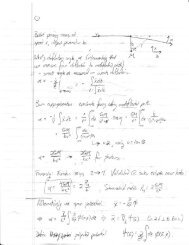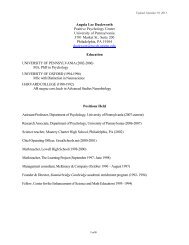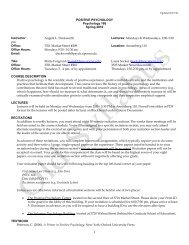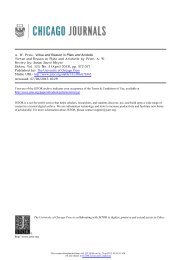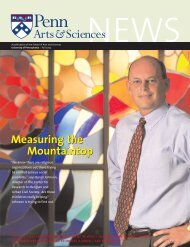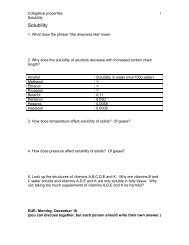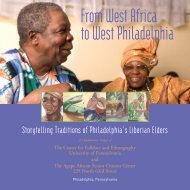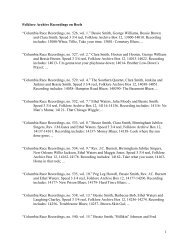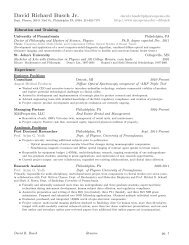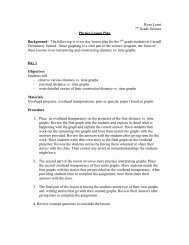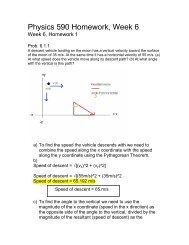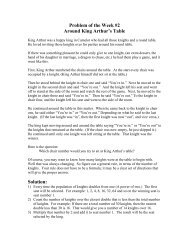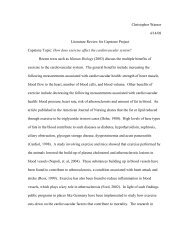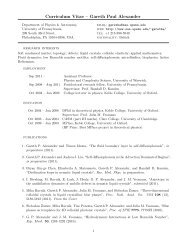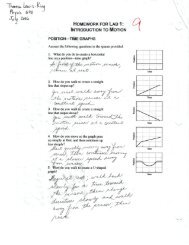PENN SUMMER - University of Pennsylvania
PENN SUMMER - University of Pennsylvania
PENN SUMMER - University of Pennsylvania
You also want an ePaper? Increase the reach of your titles
YUMPU automatically turns print PDFs into web optimized ePapers that Google loves.
well as on nonfictional accounts (journals, diaries, and documentaries)<br />
that explore the emotional and somatic aspects <strong>of</strong> conditions<br />
such as cancer, plague, hysteria, syphilis, madness, and homosexuality.<br />
As a trans-historical study <strong>of</strong> Western medicine from classical<br />
influences through the innovations <strong>of</strong> Paris Medicine and then to the<br />
present day, we will be concerned with the power <strong>of</strong> narratives to<br />
bring coherence and meaning to lives at moments <strong>of</strong> great physical<br />
and emotional crisis. Inspired by recent historiographical trends to<br />
study the history <strong>of</strong> medicine from the bottom up, this course moves<br />
away from a methodology that emphasizes the great men <strong>of</strong> science<br />
to one that centers on the concerns <strong>of</strong> sick persons. In reading<br />
works <strong>of</strong> literature by authors such as John Milton, Molie, Frances<br />
Burney, Daniel Defoe, William Wordsworth, Sigmund Freud, Sylvia<br />
Plath, and others, we will study contemporaneous medical topics,<br />
including quackery, the history <strong>of</strong> midwifery, humoural theories <strong>of</strong><br />
the body, advancements in autopsy, the elevation <strong>of</strong> the pr<strong>of</strong>essional<br />
surgeon, the birth <strong>of</strong> sexology, the rise <strong>of</strong> psychotherapy, and the<br />
clinical gaze.<br />
enVironMenTal STUDieS<br />
enVs 200 900 T 5:30pm–8:30pm staff<br />
Introduction to Environmental Analysis<br />
Fulfills Physical World Sector, Quantitative Data Analysis Requirement<br />
Introduction to Environmental Analysis will expose students to the<br />
principles that underlie our understanding <strong>of</strong> how the Earth works.<br />
The goal <strong>of</strong> Earth Systems Science is to obtain a scientific understanding<br />
<strong>of</strong> the entire Earth system by describing its component parts (lithosphere,<br />
hydrosphere, atmosphere, biosphere) and their interactions,<br />
and describe how they have evolved, how they function, and how<br />
they may be expected to respond to human activity. The challenge<br />
to Earth Systems Science is to develop the capability to predict those<br />
changes that will occur in the next decade to century, both naturally<br />
and in response to human activity. Energy, both natural and humangenerated,<br />
will be used as a unifying principle. Knowledge gained<br />
through this course will help students make informed decisions in all<br />
spheres <strong>of</strong> human activity: science, policy, economics, etc.<br />
GeoloGY<br />
geol 100 900 W 5:30pm–8:40pm omar<br />
Introduction to Geology<br />
Fulfills Physical World Sector, Quantitative Data Analysis Requirement / Field<br />
trips required.<br />
An introduction to processes and forces that form the surface and the<br />
interior <strong>of</strong> the Earth. Topics include, changes in climate, the history<br />
<strong>of</strong> life, as well as earth resources and their uses.<br />
healTh & SoCieTieS<br />
hsoC 131 900 W 6:00pm–9:10pm Mackenzie<br />
Sustainability and Public Health<br />
This course will explore how the goals <strong>of</strong> the sustainability movement<br />
affect public health policy. It asks the question, “To what extent<br />
is sustainability the most important public health issue <strong>of</strong> our<br />
time?” We will examine issues related to climate change, peak oil,<br />
environmental toxins, ecosystem destruction, water availability, and<br />
food production through the lens <strong>of</strong> public health policy. On a more<br />
positive note, we will learn about how applications <strong>of</strong> whole systems<br />
thinking are transforming our culture, creating a more sustainable<br />
and healthier society, and how these cultural trends will transform<br />
public health policy in the future.<br />
hiSTorY<br />
hIsT 323 900 MW 6:00pm–7:40pm Thompson<br />
American Cultural History to 1865<br />
This seminar will examine the everyday lives <strong>of</strong> early Americans as<br />
well as the key sources <strong>of</strong> cultural change between 1600 and 1865.<br />
We will look at a range <strong>of</strong> issues, including: sexuality; changing conceptualizations<br />
<strong>of</strong> death and childhood; the rise <strong>of</strong> consumer culture;<br />
and the racialized and gendered politics <strong>of</strong> early modern identity. We<br />
will visit halls, taverns, city streets, churches, slave quarters, shops,<br />
and bed chambers where we will observe the comings and goings <strong>of</strong><br />
some fascinating people. We will also interrogate the pivotal interdisciplinary<br />
methods and theoretical approaches scholars have used<br />
to write early American cultural history. Readings will comprise a<br />
sampling <strong>of</strong> recent scholarship as well as a variety <strong>of</strong> colorful primary<br />
sources such as diaries and private correspondences. We will also<br />
study objects, 18th-century prints, and photographs. Requirements<br />
for the course include active discussion, critical reading, a mid-term<br />
paper (3–5 pages), and a seminar paper (10–12 pages).<br />
PhiloSoPhY<br />
PhIl 002 900 W 6:00pm–9:10pm Meyer<br />
Ethics<br />
Fulfills Society Sector<br />
How should we go about morally evaluating our actions? We will<br />
read, discuss, and critique historical and contemporary answers to<br />
this question. Some moral philosophers focus on evaluating our actions<br />
in terms <strong>of</strong> their consequences, while others believe the intentions<br />
motivating our actions are <strong>of</strong> crucial moral importance. Still<br />
others recommend that we attend to the meaning <strong>of</strong> our actions—<br />
what we say by acting as we do. We will also look at historical and<br />
contemporary theories that focus on evaluating ourselves rather than<br />
our actions. Readings in this class will concern both practical problems<br />
(such as cosmetic surgery, abortion, affirmative action, and war)<br />
and theoretical issues.<br />
PoliTiCal SCienCe<br />
PsCI 116 900 T 5:30pm–8:30pm sil<br />
Political Change in the Third World<br />
Fulfills Society Sector<br />
This course will be provide a broad overview <strong>of</strong> political economy<br />
and social change in countries in Asia, Africa, and Latin America. This<br />
is not, however, a current-affairs course; the emphasis is on tracing<br />
how historical forces have influenced political, economic, and social<br />
institutions (or lack there<strong>of</strong>) in countries that have endured colonialism.<br />
Although we will study such political phenomena as nationalism<br />
and democratization in some detail, we will also consider the linkages<br />
between these and economic, socio-cultural, and international<br />
factors.<br />
UnDERgRADUATE 12-WEEK <strong>SUMMER</strong> SESSIOn • MAY 24-AUgUST 13, 2010 13



